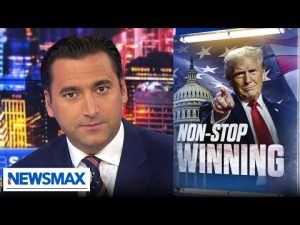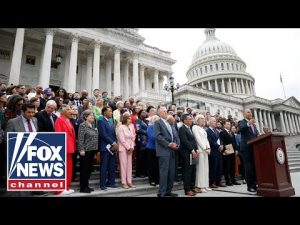In the unfolding saga of maneuvering through America’s complex legislative landscape, Speaker Mike Johnson and his Republican comrades are buzzing with anticipation as they attempt to deliver a bill that could potentially cement President Trump’s legacy. Behind the charm of anticipated tax cuts, this bill also enfolds vital funding for national defense, school choice, and notably, immigration enforcement. While many conservatives are heartened by extensions in tax cuts, the spending provisions have gingerly raised eyebrows among some Republicans. It’s hard not to appreciate the irony in the balancing act of fiscal conservatism and the relentless drive to address sweeping national priorities.
As the GOP huddles to maximize support for the bill, a smattering of skepticism emerged. Some Republicans feel the butterfly effect of increased spending might ruffle the golden feathers of fiscal responsibility. However, for the guitarists of Trump’s orchestra, working in harmony has struck a comforting chord. With the Freedom Caucus flexing its influence, efforts are directed towards a crescendo of economic growth and debt reduction. A significant focus of the bill is supercharging immigration enforcement, with a spotlight on border security and deportation acceleration—a crucial Trump agenda item bound to excite card-carrying supporters.
Yet, no political opera would be complete without an unruly chorus, in this case, led by Elon Musk, muscling in with his orchestra of financial influence. He has amusingly threatened to bankroll campaigns against any Republican who strayed from the hard path of fiscal restraint. While Musk’s multifarious enterprises from space odyssey to electric cars are noteworthy, some might suggest sticking to rockets instead of rattling the reliable republicans. This theatrical interlude seems to have little effect on steering the course, as President Trump’s baton continues to beat with assertive leadership.
On the backdrop of economic whirlwinds, the Federal Reserve Chair’s retort on tariffs stirs yet another heated debate. The Fed’s quizzical approach to confronting tariffs begs the question of whether it’s all deliberate prudence or a symptom of what one might humorously suggest as a tariff derangement syndrome. As differing opinions float about the economic theater, the markets seem to politely disagree with the candlelight vigil for doomsday inflation scenarios. The buoyant state of both the stock and bond markets bodes well, echoing the confidence many Republicans place in market indicators over the so-called financial aficionados—and who wouldn’t trust the market over pundits with coffee-stained ties?
In this continued ballet between policy maneuvers and the market’s unpredictable jive, Wall Street finds itself waist-deep in cautious optimism. If anything, the current sentiment showcases the sharp divide between economic theory and practical market realities. As conservatives lean on the reassuring rhythms of a bullish market and Trumpian resolve, perhaps by this coming fall, the doubters will see the wisdom behind what might seem a chaotic composition. After all, in American politics, as in life, it often pays to dance to your own tune—the louder, the better.







